Etymology is a branch of lexicology studying the origin of words. Etymologically, the English vocabulary is divided into native and loan words, or borrowed words. A native word is a word which belongs to the original English word stock and is known from the earliest available manuscripts of the Old English period. A borrowed word is a word taken over from another language and modified according to the standards of the English language. More than two thirds of the English vocabulary are borrowings. Mostly they are words of Romanic origin (Latin, French, Italian, Spanish). Borrowed words are different from native ones by their phonetic structure, by their morphological structure and also by their grammatical forms. Nowadays English has become a «giving» language.
There are some roles of borrowings.
Role 1.
It is the influence of borrowings on the phonetic structure of English words and the sound system resulted in:
− the appearance of a new diphthong [oi] which came into English together with such French words as point, joint, poise;
− the reappearance of the initial [sk] mostly due to Scandinavian borrowings.
Role2.
The influence of borrowings on the word-structure and the system of word building resulted in:
− the appearance of a great number of words with bound morphemes, e.g. tolerate, tolerable, tolerance, toleration;
− the change of the very nature of word-clusters which now unite not only words of the root-morphemes, but of different synonymous root-morphemes, e.g. spring —vernal; sea —maritime.
Role3.
The influence of borrowings on the semantic structure of English words resulted in:
− the differentiation of borrowed words and synonymous native words in meaning and use, cf.: feed (native) — nourish (L);
− the extension of meaning of native English words or the acquisition of additional or new meanings, e.g. the political meanings of shock and deviation have come from the Russian ударный and уклон.
Role4.
The influence of borrowings on the lexical territorial divergence
resulted in:
− the intensification of the difference between the word-stock of the literary national language and dialects owing to the borrowing of words into the literary national language which are not found in the dialects, and vice versa;
− the acquisition by literary national words of a status of dialectal words, e.g. heal—скрывать, покрывать (OE helan).
There are two ways for borrowings to enter the language: through oral speech (by immediate contact between the people) and through written speech (by indirect contact through books, literature).
Oral borrowing took place chiefly in the early periods of history, whereas written borrowing has become important in more recent times. Words borrowed orally are usually short (Lat. inch, mill, street) and they are successfully assimilated to the English language and are usually hardly recognizable as foreign.
Types:
- Loanwords proper (alien words) — words borrowed from a foreign language without any change of the foreign sound and spelling. They retain their sound-form, graphic peculiarities and grammatical characteristics. For example, ballet, bouquet, chauffeur, coup d'état, phenomenon, table d'hôte, vis-à-vis, etc.
- Translation-loans are words and expressions formed from the material already existing in the British language but according to patterns taken from anotherlanguage, by way of word-for-word translation, For example, mother-tongue (from Lat. lingua materna), wall newspaper (from Russian), by heart (from Fr. par coeur), a slip of the tongue (from Lat. lapsus linguae).
- Semantic borrowings is the appearance in an English word of a new meaning due to the influence of a related word in another language. F.e. The word pioneer mean «explorer», now under the influence of the Russian word” pioneer “it means” a member of the Young Pioneers’ Organization».
The questionnaire was made. We wanted to determine the level of knowledge of English borrowings among senior students of school #19.
Question 1: Do you know the meaning of the term borrowings?
98 % of the students know

Question 2: Borrowing is
About 80 % know
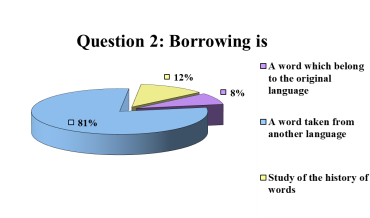
Question 3: How many English words are borrowed from Latin?
Every student is right. The answers were very close.
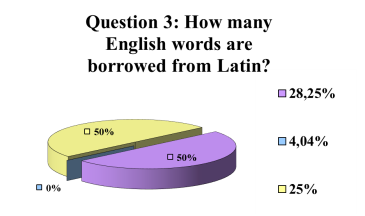
Question 4: Choose the line in which all words are borrowed from Latin
35 % choose the right answer.
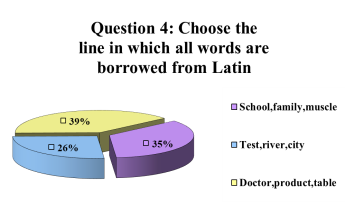
According to the results of the questionnaire we concluded that:
− The level of knowledge of borrowings among senior students of school #19 differs. The students of the 10form showed one of the best results and it can be explained by their attention to the task and having more spare time for their self-development.
− The 8, 9 forms had a little difference. The reason might be not having enough interest in learning borrowings.
− At the same time, the results of the 11 form are better thanks to the fact that they have more experience in learning foreign languages and they learnt more information on this topic.
Characteristics of amount of Latin borrowings in different texts of Student’s Book “Starlight 10”:
Text 1.
Student’s book “Starlight”, Unit 1.3, page 11, “The London marathon”
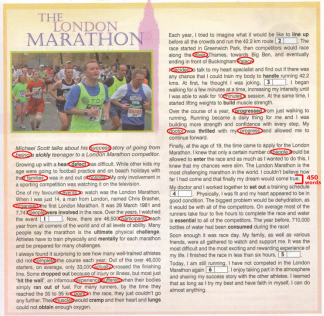
After analyzing the part of the text 1 concluded that 5.1 % (23 words out of 450 words) of the text are words which are borrowed from Latin.
Text 2.
Student’s book “Starlight”, Unit 2.1, page 36, “Mirror, mirror on the wall…”
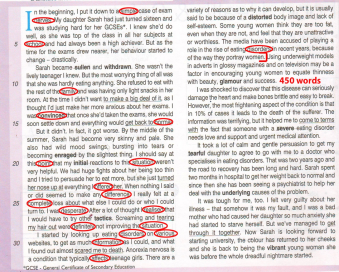
After analyzing of the part of text I concluded that 4.2 % (19 words out of 450 words) of the text are words which are borrowed to English from Latin.
Text 3.
Student’s book “Starlight”, Unit 2.3, page 41, “Live long and prosper”

After analyzing of the part of text I concluded that 4.2 % (19 words out of 450 words) of the text are words which are borrowed from Latin
Text 4.
Student’s book “Starlight”, Unit 2.14, page 62, “Why does food go bad”

After analyzing of the part of text I concluded that 2.8 % (13 words out of 450 words) of the text are words which are borrowed from Latin.
I identified in 4 texts that the amount of borrowed words does not depend on the complexity of the text. After analyzing I concluded that quantity of borrowings depends on the theme of the texts.
References:
- The Mother Tongue: English and How It Got That Way, 1990/Bryson B. — New York: Avon.
- Borrowed Words: A History of Loanwords in English,2014/ Durkin P. — Oxford University Press.
- The Story of English, 1986./McCrumR., Cran W., MacNeil R., — New York, Elisabeth Sifton.
- Эванс, В. Учебное издание “Звездный английский”/Эванс В. и др.- Москва, Express Publising, “Просвещение”, 2018. — 11с, 36с, 41с, 62с.

